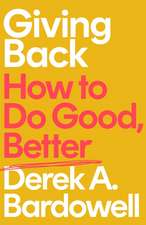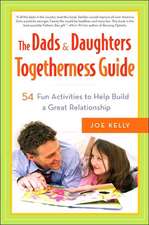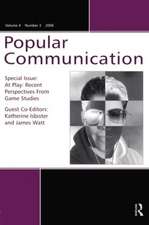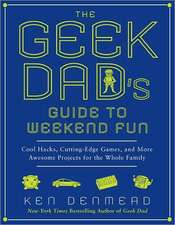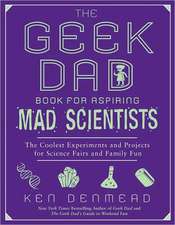Geek Dad: Awesomely Geeky Projects and Activities for Dads and Kids to Share
Autor Ken Denmead Chris Andersonen Limba Engleză Paperback – 30 apr 2010 – vârsta de la 18 ani
Vezi toate premiile Carte premiată
Books for a Better Life (2010)
The ultimate DIY project guide for techie dads raising kids in their own geeky image, in the spirit of The Dangerous Book for Boys
Today's generation of dads grew up more tech-savvy than ever. Rather than joining the Little League team, many grew up playing computer games, Dungeons and Dragons, and watching Star Wars. Now with kids of their own, these digital-age dads are looking for fresh ways to share their love of science and technology, and help their kids develop a passion for learning and discovery.
Enter supergeek, and father of two, Ken Denmead. An engineer and editor of the incredibly popular GeekDad blog on wired.com, Ken has created the ultimate, idea-packed guide guaranteed to help dads and kids alike enjoy the magic of playtime together and tap into the infinite possibility of their imagination. With illustrations throughout, this book offers projects for all ages to suit any timeframe or budget. With Denmead's expert guidance, you and your child can:
•Fly a night-time kite ablaze with lights or launch a video camera with balloons
•Construct the "Best Slip n' Slide Ever," a guaranteed thrill ride
•Build a working lamp with LEGO bricks and CDs
•Create a customized comic strip or your own board game
•Transform any room into a spaceship
•Make geeky crafts like cyborg jack-o'-lanterns or Ethernet cuff links
Brimming with endlessly fun and futuristic tidbits on everything from gaming to gadgets, GeekDad helps every tech-savvy father unleash his inner kid-and bond with the next generation of brainiacs.
Today's generation of dads grew up more tech-savvy than ever. Rather than joining the Little League team, many grew up playing computer games, Dungeons and Dragons, and watching Star Wars. Now with kids of their own, these digital-age dads are looking for fresh ways to share their love of science and technology, and help their kids develop a passion for learning and discovery.
Enter supergeek, and father of two, Ken Denmead. An engineer and editor of the incredibly popular GeekDad blog on wired.com, Ken has created the ultimate, idea-packed guide guaranteed to help dads and kids alike enjoy the magic of playtime together and tap into the infinite possibility of their imagination. With illustrations throughout, this book offers projects for all ages to suit any timeframe or budget. With Denmead's expert guidance, you and your child can:
•Fly a night-time kite ablaze with lights or launch a video camera with balloons
•Construct the "Best Slip n' Slide Ever," a guaranteed thrill ride
•Build a working lamp with LEGO bricks and CDs
•Create a customized comic strip or your own board game
•Transform any room into a spaceship
•Make geeky crafts like cyborg jack-o'-lanterns or Ethernet cuff links
Brimming with endlessly fun and futuristic tidbits on everything from gaming to gadgets, GeekDad helps every tech-savvy father unleash his inner kid-and bond with the next generation of brainiacs.
Watch a Video
Preț: 109.71 lei
Nou
Puncte Express: 165
Preț estimativ în valută:
20.100€ • 22.82$ • 17.65£
20.100€ • 22.82$ • 17.65£
Carte disponibilă
Livrare economică 31 martie-14 aprilie
Preluare comenzi: 021 569.72.76
Specificații
ISBN-13: 9781592405527
ISBN-10: 1592405525
Pagini: 222
Dimensiuni: 181 x 227 x 14 mm
Greutate: 0.43 kg
Editura: GOTHAM BOOKS
ISBN-10: 1592405525
Pagini: 222
Dimensiuni: 181 x 227 x 14 mm
Greutate: 0.43 kg
Editura: GOTHAM BOOKS
Extras
Introduction
About Being a Geek and a Dad
Once upon a time, the word geek was used to describe circus performers. Then it evolved as a pejorative to describe awkward, skinny kids who got routinely thrown into school lockers by the high school football team. But these days, geek has reinvented itself. This is the era of the geek. And geeks are cool.
There is some interchangeability between geek and nerd. They both generally describe someone of restricted social ability who finds enjoyment in pursuits outside the mainstream—pursuits like computers, role-playing games (RPGs), science fiction and fantasy literature and movies, science and engineering, and so on—you get the idea. But there is a key difference between the geek and the nerd.
One renowned geek dad (and honorary GeekDad), Wil Wheaton, describes it pretty simply: A geek is a self-aware nerd. It makes a lot of sense to me—I think geeks had those social issues growing up and liked all those things that weren’t part of the popular culture in school, but we came to understand our nature and, in a very Kübler-Ross kind of way, moved past the self-limiting aspects of nerdhood to a state of acceptance, and even enjoyment, of our place in the universe. Which, in a funny way, helped us take care of some of those social issues, because a lot of us ended up actually getting married and having kids (which totally rocks!).
I think part of the current ascendancy of geeks in general, and GeekDads specifically, is that there are a lot more geeky women than people realize, and some of us geeky guys were smart enough to recognize our own kind and attempt to mate and perpetuate the subspecies.
But before I get too far along, let me point out something important: Geeks aren’t just about the computers and the D&D and the passion for anime and comic books. There’s a whole lot more out there that people get passionate about, even mildly obsessive about, that can qualify them as geeks. If you’re so passionate about something that you’re not just good at it but can lose yourself doing it for long periods of time (often to your social detriment), you may be a geek. If you carry encyclopedic knowledge about a topic and will joyfully use it to act as the pedant whenever the subject is being discussed, you may be a geek. If you have a room in your house devoted to a hobby that other family members avoid talking about, you may indeed be a geek. I’m not talking about “experts” or “professionals”—I’m talking about the real deal. Here are some examples:
So, what are the factors that make up the geek? I’d like to posit that the geek is a combination of common personality factors that we see in all sorts of people. Indeed, these factors taken alone or only in pairs may lead to less desirable characters. See, for example, the Venn diagram below (talk about geeky!), where I’ve described the possible combinations of key personality factors that make up the geek, and its associated stereotypes: Knowledgeability, Obsessiveness, and Social Skills.
Knowledgeability represents having significant stored information with easy recall. That knowledge may be broad and relatively shallow—the know-it-all—or it may cover only a few topics but be deep and profound—the expert/ problem solver.
Obsessiveness is a person’s ability to lose himself in something he has a passion for. Common symptoms include losing track of time while coding HTML/ CSS or staying up until four a.m. to finish Portal because you had to earn watching the final credits (and hearing that awesome Jonathan Coulton song).
Social Skills can mean a lot of things, not all of which are about being “popular,” which geeks and nerds always feel they never were in their formative years. But geeks do at least have enough presence and personality to form lasting relationships, which helps differentiate them.
So first, it’s easy to tag all the stand-alones: Dorks are the people who are obsessive without the introspection to recognize it in themselves or how it could affect others. Dweebs know everything but can’t apply or express themselves. Goobers are good-natured but lazy idiots—no one minds them, but they aren’t much use.
It starts to get interesting when you begin combining the traits. The classic nerd has knowledge/intelligence AND the obsessive nature that produces results. You can’t expect them to carry on conversations that won’t lose a non-nerd audience—they would talk your ear off about something as nerdy as the exciting application of quantum theory on the flow of mold over a piece of cheese, but set them to work on a project without distraction, and you’ll be able to mine the results for pure gold (especially if it has to do with World of Warcraft and, you know, gold mining).
The twit—well, I suppose there are other names for this person, probably a lot of regional variations—but the twit combines obsessiveness and social skills into a double-edged sword. This could be that sales guy who can talk up a storm but who really doesn’t know squat, or it could be the diligent hard worker everyone likes but who really just doesn’t get it.
And then there’s the gadfly. He’s smart and he gets invited to parties, but he’s lazy. Or worse, he’s intellectually smart but emotionally ignorant, and doesn’t care. He’s the one most likely to be the pedant in any gathering, and he probably uses people to get the work done he finds beneath him.
Of course those are extremes, and there are perfectly lovely, functional people who fall into those categories; but they’re not the ones we’re here to talk about. In the sweet spot, right there in the middle, is the tripartite synergy that creates the geek. The mixture of knowledge (about comic books, particle physics, or the works of Mozart), obsessiveness (they’ll sit in front of a computer or a workbench for hours perfecting, building, or playing anything), and social skills (they actually get together with people for pen-and-paper RPGs or get in line with a bunch of friends to see the midnight showing of the next Star Trek movie), that makes a well-rounded, self-sustaining person of affable oddity.
Now maybe weigh it just slightly toward the social skill set, and you have someone who can actually get a date, find a mate, get married, and procreate. That, in a nutshell, is how a GeekDad comes into being. The conditions need to continue to be favorable—is there support at home for ongoing geekiness? Will infecting the child(ren) be allowed? How many times will the wife feign a chuckle when you lift your little tyke and in a deep voice intone, “Luke, I am your father” (knowing it’s a misquote) before it gets old? How many jokes about containment breaches will be tolerated at diaperchanging time?
It helps immeasurably when your mate is a geek, too (but that’s another book). I’ve been lucky enough to have that situation in my marriage. In fact, not only have my little quirks been tolerated, but some of them have actually been encouraged. And in return, I encourage back. I mean, how many men can say their wives wanted a trip to a science fiction convention for their anniversary? I’m one lucky man.
But the best part is getting to share with my kids, share the geeky things that informed my childhood and continue to inform my existence: Star Wars, Star Trek, math, science, reading, writing, music, computers and video games, movies and television. I can’t tell you the joy of having my kids get into Doctor Who and comic books and Lord of the Rings, and then talking with them about the important aspects of the stories and watching them just soak it up. I lived through the school years as a breed apart (though I had good friends who were geeks, too), so it makes me feel great to be able to inform and guide my kids through the social aspects, and the occasional challenges, of growing up as a geek. All parents want to protect their kids, but I like to think the best protection I can offer them is to help them understand what will happen, why, and how to best deal with it. I want them to know that different isn’t bad, and that being intelligent and inquisitive is something to be proud of.
Indeed, that’s what being a GeekDad really means for me. For all our personality quirks and interests in pursuits that are outside the mainstream (or at least interests more technical than is usually palatable for the mainstream), we’re all about understanding, and communicating, and connecting with others by sharing what we love and helping others to grok it as well. Of course there’s a biological imperative to have kids and raise them to survive and thrive, but we want them to be happy, too—whatever happiness may mean to them.
I’ll encourage my kids to love what I do, but I won’t force it on them, and when they want to try something different, I’m happy to let them just as long as they come at it like a geek: They should be knowledgeable about it, be a little obsessive about it, and get along with the other people who are doing it. That’s what all the greatest geeks do.
Geeky Projects for Dads and Kids to Share
Most “parenting” books aren’t about things you can do with your kids. Most are about things to do to your kids, tricks and tactics for tweaking their behavior in some desired manner usually at odds with what kids really want: to play, and spend real quality time with you.
I’m not saying all those books are bad. Some of them do try to reinforce the idea of spending quality time (though I’d really like to find a new phrase to replace quality time) with your kids. This book has the same goal of those others: to help you share time with your kids in their formative years in constructive, educational ways, without making that time seem as if it’s supposed to be constructive or educational (not always easy). The difference here is that from a geek’s perspective, constructive and educational may not mean what all those other books think it means. Here’s what makes our approach different:
- Geeks like games that require a fantastic imagination.
- Geeks love science and knowing how things work. Experimentation is the best way to learn those things. If things go “boom” in the process, all the better.
- Geeks love finding interesting, „ creative solutions for problems that could be solved in a more mundane fashion.
- Geeks love to play, but in playing, to build and learn as well.
There is a plethora of projects included here about an eclectic array of subjects, from board games to electronics, crafts to coding. But I’m not here to tell you exactly what to do. The instructions are meant give you a structure to start your adventure with your kids. Each of these projects will allow for extensive customization and personalization. Indeed, what I have in my workshop and available at the hardware store in my town may be rather different from what you have. So I expect you to improvise, adapt, and even (quite likely) improve on these projects.
Project Information
At the start of each project, you’ll see a table with summary information to give you an idea what to expect from it, and there are some symbols not unlike what you see in a restaurant or hotel review to explain cost and difficulty. Here’s a legend to explain their meaning.
One thing you’ll notice as you go through the projects in this book is that they are not long, costly, or overly difficult and involved projects that take too much work before paying off in the fun department. If you and your kid have the kind of patience and geeky determination to spend days/weeks/months on a project, then let me suggest you take up painting Warhammer armies or mapping the visible sky in your area with a telescope you built from scratch.
It’s not that I don’t have respect for folks that do that kind of thing! On the contrary, they are the epitome of geekhood, and I am not worthy to clean their brushes or polish their lenses. I just don’t have that kind of time or energy. I want to do something fun with my kids NOW (or at least in the few minutes to couple of hours it takes to complete any project in this book). So you’ll find that the most important common features all these projects have is that they are accessible, affordable, and truly buildable for just about anyone with an ounce of geek in them.
Okay, it’s time. Go get your kid(s) and get started!
About Being a Geek and a Dad
Once upon a time, the word geek was used to describe circus performers. Then it evolved as a pejorative to describe awkward, skinny kids who got routinely thrown into school lockers by the high school football team. But these days, geek has reinvented itself. This is the era of the geek. And geeks are cool.
There is some interchangeability between geek and nerd. They both generally describe someone of restricted social ability who finds enjoyment in pursuits outside the mainstream—pursuits like computers, role-playing games (RPGs), science fiction and fantasy literature and movies, science and engineering, and so on—you get the idea. But there is a key difference between the geek and the nerd.
One renowned geek dad (and honorary GeekDad), Wil Wheaton, describes it pretty simply: A geek is a self-aware nerd. It makes a lot of sense to me—I think geeks had those social issues growing up and liked all those things that weren’t part of the popular culture in school, but we came to understand our nature and, in a very Kübler-Ross kind of way, moved past the self-limiting aspects of nerdhood to a state of acceptance, and even enjoyment, of our place in the universe. Which, in a funny way, helped us take care of some of those social issues, because a lot of us ended up actually getting married and having kids (which totally rocks!).
I think part of the current ascendancy of geeks in general, and GeekDads specifically, is that there are a lot more geeky women than people realize, and some of us geeky guys were smart enough to recognize our own kind and attempt to mate and perpetuate the subspecies.
But before I get too far along, let me point out something important: Geeks aren’t just about the computers and the D&D and the passion for anime and comic books. There’s a whole lot more out there that people get passionate about, even mildly obsessive about, that can qualify them as geeks. If you’re so passionate about something that you’re not just good at it but can lose yourself doing it for long periods of time (often to your social detriment), you may be a geek. If you carry encyclopedic knowledge about a topic and will joyfully use it to act as the pedant whenever the subject is being discussed, you may be a geek. If you have a room in your house devoted to a hobby that other family members avoid talking about, you may indeed be a geek. I’m not talking about “experts” or “professionals”—I’m talking about the real deal. Here are some examples:
So, what are the factors that make up the geek? I’d like to posit that the geek is a combination of common personality factors that we see in all sorts of people. Indeed, these factors taken alone or only in pairs may lead to less desirable characters. See, for example, the Venn diagram below (talk about geeky!), where I’ve described the possible combinations of key personality factors that make up the geek, and its associated stereotypes: Knowledgeability, Obsessiveness, and Social Skills.
Knowledgeability represents having significant stored information with easy recall. That knowledge may be broad and relatively shallow—the know-it-all—or it may cover only a few topics but be deep and profound—the expert/ problem solver.
Obsessiveness is a person’s ability to lose himself in something he has a passion for. Common symptoms include losing track of time while coding HTML/ CSS or staying up until four a.m. to finish Portal because you had to earn watching the final credits (and hearing that awesome Jonathan Coulton song).
Social Skills can mean a lot of things, not all of which are about being “popular,” which geeks and nerds always feel they never were in their formative years. But geeks do at least have enough presence and personality to form lasting relationships, which helps differentiate them.
So first, it’s easy to tag all the stand-alones: Dorks are the people who are obsessive without the introspection to recognize it in themselves or how it could affect others. Dweebs know everything but can’t apply or express themselves. Goobers are good-natured but lazy idiots—no one minds them, but they aren’t much use.
It starts to get interesting when you begin combining the traits. The classic nerd has knowledge/intelligence AND the obsessive nature that produces results. You can’t expect them to carry on conversations that won’t lose a non-nerd audience—they would talk your ear off about something as nerdy as the exciting application of quantum theory on the flow of mold over a piece of cheese, but set them to work on a project without distraction, and you’ll be able to mine the results for pure gold (especially if it has to do with World of Warcraft and, you know, gold mining).
The twit—well, I suppose there are other names for this person, probably a lot of regional variations—but the twit combines obsessiveness and social skills into a double-edged sword. This could be that sales guy who can talk up a storm but who really doesn’t know squat, or it could be the diligent hard worker everyone likes but who really just doesn’t get it.
And then there’s the gadfly. He’s smart and he gets invited to parties, but he’s lazy. Or worse, he’s intellectually smart but emotionally ignorant, and doesn’t care. He’s the one most likely to be the pedant in any gathering, and he probably uses people to get the work done he finds beneath him.
Of course those are extremes, and there are perfectly lovely, functional people who fall into those categories; but they’re not the ones we’re here to talk about. In the sweet spot, right there in the middle, is the tripartite synergy that creates the geek. The mixture of knowledge (about comic books, particle physics, or the works of Mozart), obsessiveness (they’ll sit in front of a computer or a workbench for hours perfecting, building, or playing anything), and social skills (they actually get together with people for pen-and-paper RPGs or get in line with a bunch of friends to see the midnight showing of the next Star Trek movie), that makes a well-rounded, self-sustaining person of affable oddity.
Now maybe weigh it just slightly toward the social skill set, and you have someone who can actually get a date, find a mate, get married, and procreate. That, in a nutshell, is how a GeekDad comes into being. The conditions need to continue to be favorable—is there support at home for ongoing geekiness? Will infecting the child(ren) be allowed? How many times will the wife feign a chuckle when you lift your little tyke and in a deep voice intone, “Luke, I am your father” (knowing it’s a misquote) before it gets old? How many jokes about containment breaches will be tolerated at diaperchanging time?
It helps immeasurably when your mate is a geek, too (but that’s another book). I’ve been lucky enough to have that situation in my marriage. In fact, not only have my little quirks been tolerated, but some of them have actually been encouraged. And in return, I encourage back. I mean, how many men can say their wives wanted a trip to a science fiction convention for their anniversary? I’m one lucky man.
But the best part is getting to share with my kids, share the geeky things that informed my childhood and continue to inform my existence: Star Wars, Star Trek, math, science, reading, writing, music, computers and video games, movies and television. I can’t tell you the joy of having my kids get into Doctor Who and comic books and Lord of the Rings, and then talking with them about the important aspects of the stories and watching them just soak it up. I lived through the school years as a breed apart (though I had good friends who were geeks, too), so it makes me feel great to be able to inform and guide my kids through the social aspects, and the occasional challenges, of growing up as a geek. All parents want to protect their kids, but I like to think the best protection I can offer them is to help them understand what will happen, why, and how to best deal with it. I want them to know that different isn’t bad, and that being intelligent and inquisitive is something to be proud of.
Indeed, that’s what being a GeekDad really means for me. For all our personality quirks and interests in pursuits that are outside the mainstream (or at least interests more technical than is usually palatable for the mainstream), we’re all about understanding, and communicating, and connecting with others by sharing what we love and helping others to grok it as well. Of course there’s a biological imperative to have kids and raise them to survive and thrive, but we want them to be happy, too—whatever happiness may mean to them.
I’ll encourage my kids to love what I do, but I won’t force it on them, and when they want to try something different, I’m happy to let them just as long as they come at it like a geek: They should be knowledgeable about it, be a little obsessive about it, and get along with the other people who are doing it. That’s what all the greatest geeks do.
Geeky Projects for Dads and Kids to Share
Most “parenting” books aren’t about things you can do with your kids. Most are about things to do to your kids, tricks and tactics for tweaking their behavior in some desired manner usually at odds with what kids really want: to play, and spend real quality time with you.
I’m not saying all those books are bad. Some of them do try to reinforce the idea of spending quality time (though I’d really like to find a new phrase to replace quality time) with your kids. This book has the same goal of those others: to help you share time with your kids in their formative years in constructive, educational ways, without making that time seem as if it’s supposed to be constructive or educational (not always easy). The difference here is that from a geek’s perspective, constructive and educational may not mean what all those other books think it means. Here’s what makes our approach different:
- Geeks like games that require a fantastic imagination.
- Geeks love science and knowing how things work. Experimentation is the best way to learn those things. If things go “boom” in the process, all the better.
- Geeks love finding interesting, „ creative solutions for problems that could be solved in a more mundane fashion.
- Geeks love to play, but in playing, to build and learn as well.
There is a plethora of projects included here about an eclectic array of subjects, from board games to electronics, crafts to coding. But I’m not here to tell you exactly what to do. The instructions are meant give you a structure to start your adventure with your kids. Each of these projects will allow for extensive customization and personalization. Indeed, what I have in my workshop and available at the hardware store in my town may be rather different from what you have. So I expect you to improvise, adapt, and even (quite likely) improve on these projects.
Project Information
At the start of each project, you’ll see a table with summary information to give you an idea what to expect from it, and there are some symbols not unlike what you see in a restaurant or hotel review to explain cost and difficulty. Here’s a legend to explain their meaning.
One thing you’ll notice as you go through the projects in this book is that they are not long, costly, or overly difficult and involved projects that take too much work before paying off in the fun department. If you and your kid have the kind of patience and geeky determination to spend days/weeks/months on a project, then let me suggest you take up painting Warhammer armies or mapping the visible sky in your area with a telescope you built from scratch.
It’s not that I don’t have respect for folks that do that kind of thing! On the contrary, they are the epitome of geekhood, and I am not worthy to clean their brushes or polish their lenses. I just don’t have that kind of time or energy. I want to do something fun with my kids NOW (or at least in the few minutes to couple of hours it takes to complete any project in this book). So you’ll find that the most important common features all these projects have is that they are accessible, affordable, and truly buildable for just about anyone with an ounce of geek in them.
Okay, it’s time. Go get your kid(s) and get started!
Descriere
Brimming with endlessly fun and futuristic tidbits on everything from gaming to gadgets, this ultimate DIY project guide helps every tech-savvy father unleash his inner kid and bond with the next generation of brainiacs. Illustrations.
Notă biografică
Premii
- Books for a Better Life Finalist, 2010

